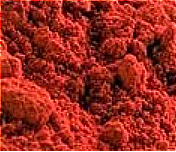CI 45100 is a chemical compound, a synthetic azo dye known by the names Acid Red 52 or Acid Red. It contains a xanthene core that makes the dye fluorescent.
The name defines the structure of the molecule
- "Acid", when related to dyes, indicates that the dye is water-soluble and forms a salt when combined with a metal, usually sodium or potassium. Acid dyes are often used to dye animal fibers like wool.
- "Red" is the color of the dye.
- "52" is a number that specifically identifies this particular red dye within a series of acid dyes.
Description of raw materials used in production
- Aniline - A common starting material for azo dye synthesis.
- Naphtalenesulfonic acid - Serves as the azo component.
- Other reagents - Various reagents and catalysts needed for specific chemical reactions.
Step-by-step summary of industrial chemical synthesis process.
- Preparation - Aniline undergoes a series of reactions to produce an intermediate suitable for azo bond formation.
- Azo bond formation - The aniline derivative reacts with naphtalenesulfonic acid in the presence of an oxidizing agent to form the azo bond.
- Purification - After the reaction, the crude dye is separated from any unreacted reagents and purified through processes like filtration and crystallization.
- Quality Control - The dye is tested to ensure it meets desired specifications.
It appears in the form of a red powder.

What it is for and where
Cosmetics
It is a restricted ingredient as IV/71 III/193 (Acid Red 52) a Relevant Item in the Annexes of the European Cosmetics Regulation 1223/2009. Substance or ingredient reported: Hydrogen 3,6-bis(diethylamino)-9-(2,4-disulphonatophenyl)xanthylium, sodium salt
Colorant. This ingredient has the function of colouring the solution in which it is inserted in a temporary, semi-permanent or permanent manner, either alone or in the presence of the complementary components added for colouring.
Hair dyeing. It is an ingredient that adds a colouring to the hair that can be temporary, semi-permanent or permanent depending on what other ingredients are added to achieve the result. The pH for hair dyeing is generally between 9 and 10.
Safety
It is an ingredient that has some important contraindications concerning the health profile: to be used only in cosmetic products that have skin contact for a short time.
The problem with azo dyes (monoazo or diazo) is photocatalytic degradation leading to oxidation and the subsequent formation of impurities such as aromatic amines, some of which have carcinogenic activity.
- Chemical name: sodium;4-[3-(diethylamino)-6-diethylazaniumylidenexanthen-9-yl]benzene-1,3-disulfonate
- Molecular Formula C27H29N2NaO7S2
- CAS 3520-42-1
- EC number 222-529-8
- UNII 821LWZ3R6R
- DTXSID7021235
Synonyms:
- Acid Red 52
- Acid red, isoxanthene


![]() CI 45100
CI 45100